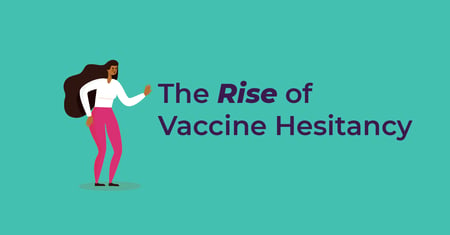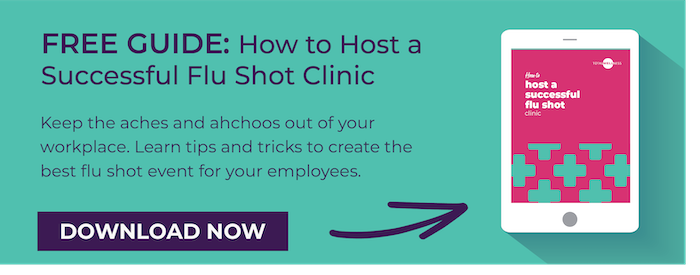America is turning away from vaccines. 
Vaccine hesitancy is not new, but the politicization of COVID-19 vaccines has exacerbated the issue. This skepticism extends beyond personal decisions, significantly affecting public health, workplace safety, and the well-being of our communities.
The reasons behind vaccine hesitancy are multifaceted, from mistrust in pharmaceutical companies and governments to the rampant spread of misinformation on social media. In the wake of a pandemic that has profoundly impacted every facet of life, employers stand in a unique, influential position to tackle vaccine hesitancy and foster a healthier, more informed workplace.
Below, learn more about the challenge of vaccine hesitancy and find out how employers can address it.
Understanding Vaccine Hesitancy
Vaccine hesitancy is a state of indecision and uncertainty about vaccination before a decision is made to act (or not act). It represents a time of vulnerability and opportunity.
Various factors influence vaccine hesitancy, including complacency, political polarization, lack of trust, alternative health, and belief-based extremism. This hesitancy is not just about choosing whether or not to receive a vaccine; it's about the deeper concerns and fears that lie beneath these decisions.
The COVID-19 pandemic has intensified these issues, with the rapid development and emergency authorization of vaccines sparking skepticism among various segments of the population. Furthermore, the polarized political climate has turned vaccination into a highly contentious issue, exacerbating concerns and dividing communities.
The Historical Context and Health Disparities
The reluctance to vaccinate, however, extends beyond COVID-19 and is deeply rooted in historical and systemic issues. Communities of color, in particular, face long-standing health disparities and a history of mistreatment by the medical community. These disparities are not just remnants of the past; they are perpetuated by ongoing racial bias, discrimination in healthcare, and practical barriers such as lack of health coverage, inadequate transportation, and insufficient paid time off. Such factors contribute to a distrust in the healthcare system, making vaccine hesitancy more prevalent in these communities.
Hesitant Parents
Although communities of color and low-income groups have been significantly impacted by vaccine hesitancy, they are not the only ones affected. Even before the pandemic, about one-third of American parents were already choosing to skip some recommended vaccines while following others and often creating their own vaccine schedules for their children.
Rural Versus Urban Divide
The divide extends to the geographical landscape of the United States, where residents in rural areas express distinct concerns about vaccine safety, long-term side effects, effectiveness, and the necessity of vaccines. This rural skepticism contrasts with the perspectives commonly found in suburban and urban areas, highlighting differences in vaccine access and confidence. The disparity between rural and urban areas underscores the need for tailored approaches to address vaccine hesitancy, ensuring that interventions consider the unique contexts and concerns of different communities.
Long-Term Impacts of Vaccine Hesitancy
The United States continues to grapple with the threat of vaccine-preventable diseases, including influenza, hepatitis B, pneumococcal disease, and shingles, as a direct consequence of insufficient vaccination coverage. This vulnerability poses a significant threat, especially to those with pre-existing health conditions and older adults.
Amidst a backdrop of new misinformation waves and a phenomenon increasingly recognized as vaccine fatigue, a notable decline in enthusiasm for receiving updated (bivalent) COVID-19 booster doses has been observed among adults. This reluctance is often fueled by concerns over vaccine safety and efficacy, concerns that are magnified by social media and news outlets that disproportionately highlight adverse reactions to COVID-19 vaccines. Such coverage can trigger cognitive biases, leading to eroded confidence in vaccines.
The situation is particularly alarming when considering the recent history of vaccine-preventable outbreaks in the U.S. Just a year prior to the pandemic, the country faced its worst measles outbreak in two decades, narrowly maintaining its measles elimination status. In 2022, polio reappeared in New York despite being a preventable disease that had long been eradicated in the U.S. Moreover, the seasonal flu vaccine's uptake has been consistently low in recent years, further evidence of the challenging landscape of vaccine hesitancy.
This trend not only leaves the population vulnerable to current threats but also weakens the nation's defenses against future pandemics. The long-term impacts of vaccine hesitancy extend beyond the immediate health consequences, threatening to undermine the hard-won gains in disease prevention and control. It underscores the imperative need for robust public health strategies that address misinformation, enhance vaccine literacy, and rebuild trust in the safety and efficacy of vaccines.
Employer's Role in Educating Employees
Employers play a crucial role in public health efforts, especially in educating their workforce about the importance of vaccinations. Here are some strategies employers can implement to address vaccine hesitancy effectively:
-
-
Provide Accurate Information: Combat misinformation by providing employees with factual, easy-to-understand information about vaccines. This can include data on vaccine safety, efficacy, and the benefits of vaccination in preventing disease outbreaks.
-
Host Expert Q&A Sessions: Organize sessions with healthcare professionals who can answer employees' questions and concerns about vaccines. Hearing information directly from medical experts can help alleviate fears and dispel myths.
-
Encourage Open Dialogue: Create a culture of openness where employees feel comfortable discussing their concerns about vaccines. Addressing hesitancy openly can lead to more employees feeling confident in their decision to get vaccinated.
-
Offer Incentives: Consider providing incentives for vaccination, such as paid time off to get vaccinated or recover from any potential side effects. Making vaccination more accessible and convenient can increase uptake.
-
Promote Vaccination as a Community Effort: Emphasize the role of vaccination in protecting not just the individual but also coworkers, families, and the community at large. Highlighting the collective benefit can encourage a sense of responsibility.
-
Respect Privacy and Choices: While promoting vaccination is important, it's also crucial to respect individual privacy and choices. Avoid coercion and focus on education and encouragement.
-
Enhancing Vaccine Accessibility
In addition to educating employees and fostering a culture of openness and trust, employers can adopt another crucial strategy to combat vaccine hesitancy: hosting on-site vaccination clinics for flu and COVID-19 shots. This approach not only underscores the employer's commitment to employee health but also significantly increases vaccine accessibility and convenience, two key factors in boosting vaccination rates.
-
-
Organizing On-Site Vaccination Clinics:
- Partnership with Healthcare Providers: Collaborate with TotalWellness to organize vaccination clinics at the workplace. This ensures the professional administration of vaccines and reliable information.
- Scheduling Convenience: Set up the clinics at times that are most convenient for employees, possibly including various shifts to accommodate different work schedules.
- Communication and Registration: Clearly communicate the details of the vaccination clinic, including how to register, what to expect, and any required documentation. Providing clear information can alleviate anxiety and streamline the process.
-
Creating a Supportive Environment:
- Addressing Concerns: During the clinic, have healthcare professionals available to answer any last-minute questions or concerns employees might have. This direct interaction can be reassuring and encouraging.
- Post-Vaccination Care: Ensure there's a comfortable area for employees to rest post-vaccination, especially important for those who might feel anxious or have mild immediate reactions.
-
Building Trust Through Visibility:
- Leadership Participation: Encourage company leaders and managers to participate and get vaccinated at the on-site clinic. Seeing leaders take the initiative can positively influence employee attitudes towards vaccination.
- Promote Community Spirit: Highlight the on-site vaccination event as part of the company's commitment to community health and safety. It reinforces the message that vaccination is a collective effort towards a healthier environment.
-
Follow-up and Feedback:
- Gathering Feedback: After the clinic, gather feedback from participants to understand their experiences and improve future events.
- Continued Communication: Keep the conversation about vaccination ongoing, addressing any new concerns or information that arises post-clinic.
-
A Path Forward
Combatting vaccine hesitancy requires a multifaceted approach that addresses the underlying causes of skepticism and builds trust in vaccines. Efforts must be sensitive to the historical context, systemic disparities, and the specific concerns of diverse communities.
As we continue to navigate the challenges posed by vaccine hesitancy, employers have a pivotal role in shaping the health of their workforce and, by extension, the community. By fostering an environment of trust, providing accurate information, and encouraging open dialogue, employers can help mitigate the impact of vaccine hesitancy and contribute to a safer, healthier future for all.



